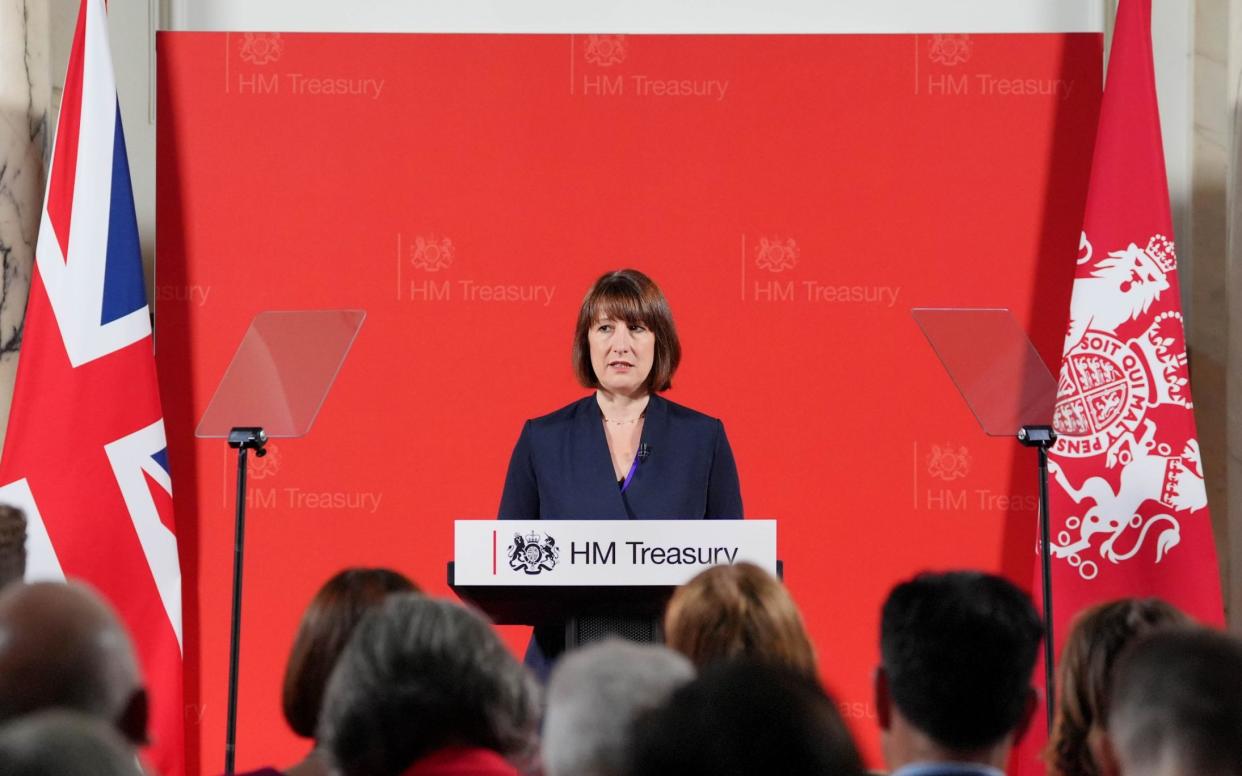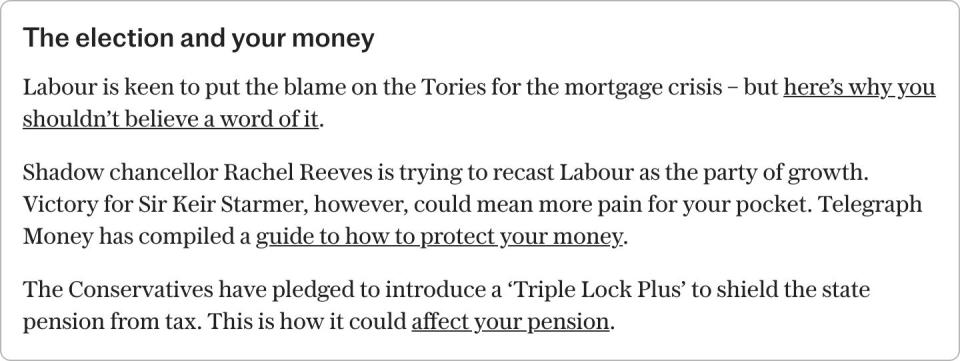What the Chancellor really meant as she vowed to fix Britain’s finances

- Oops!Something went wrong.Please try again later.
Rachel Reeves chose the Churchill Room at the Treasury to deliver her maiden speech as Chancellor.
Some of the most important announcements of the last century have been delivered there, including the creation of the NHS and the announcement of the Bank of England’s independence.
Watched by an audience of Cabinet ministers, bankers and business leaders including HSBC boss Noel Quinn and Tom Glover, UK chairman of energy giant RWE, Reeves outlined her priorities for what she described as a “national mission” to raise growth.
Here are the key elements of her speech, unspun.
Green belt building blitz
One of the Chancellor’s starkest admissions on Tuesday was that Labour’s housebuilding drive risked piling more pressure on already overstretched public services by increasing local populations.
Reeves promised to revive mandatory housing targets that could include building on areas of the green belt, as she reiterated a manifesto pledge to build 1.5 million homes over the next five years.
Trade-offs “always exist”, she said towards the end of the 10-minute speech.
“Any development may have environmental consequences, place pressure on services, and rouse voices of local opposition,” she said.
Reeves has made fiscal restraint her mantra, suggesting there will be no new money to build hundreds of new GP surgeries, dentists or schools alongside the new developments, potentially fuelling local discontent.
But she remained defiant: “We will not succumb to a status quo which responds to the existence of trade-offs by always saying no, and relegates the national interest below other priorities.”
Labour has already set out plans to build on what it calls the “grey belt” or areas of “poor quality” and “ugly” land in what is currently designated the green belt.
Reeves also stressed that her “golden rules” for development include a goal that any scheme built on the green belt land must target 50pc of housing that is deemed affordable.
Upgrading industry
Labour is unashamed about its plans to intervene in the planning system, especially when it comes to big infrastructure like gigafactories and data centres.
Reeves suggested that many of the barriers to building things will be torn down by Labour, with planners only just stopping shy of riding roughshod over local concerns. Priorities will be set at the national level, reducing the likelihood that they will be blocked by councils.
The Chancellor said two big data centres that had planning permission rejected, including a £1bn project in Hertfordshire, were already being revived under Labour.
Project leaders claimed a new data centre at Court Lane in Buckinghamshire would have led to a £670m investment in the local economy, creating around 300 jobs and reviving the Iver Court Farmhouse in the process.
Reeves insisted that the economic benefits of development will be a “central consideration” for Angela Rayner going forward, insisting that the Deputy Prime Minister “will not hesitate to review an application where the potential gain for the regional and national economies warrant it”.
Onshore wind farms
Reeves announced that Labour would end what she described as an “absurd ban on new onshore wind in England”.
The Chancellor vowed to go further, and “consult on bringing onshore wind back into the Nationally Significant Infrastructure Projects regime”. In other words, this could mean decisions on large developments are made “nationally not locally”.
This means that critical decisions on where wind farms will be built in the UK would land in the in-tray of Ed Miliband, the Energy Secretary, regardless of local opposition.
Sovereign wealth fund and pension boost
Reeves confirmed the Labour government will shortly reveal plans to invest billions of pounds in a new national wealth fund to attract more international investment and help drive the UK towards net zero.
Led by former Bank of England governor Mark Carney, the group, which includes Barclays boss C.S. Venkatakrishnan wants Britain to invest more in projects such as carbon capture and green steel, with the aim of creating thousands of jobs along the way.
The party wants to attract £3 or more of private sector investment for every £1 of public money pumped into projects. More details of the fund’s aims will be revealed this week.
Reeves said the next steps will be revealed in “short order”, with an announcement expected on Tuesday.
She also suggested Labour would build on the work started by Jeremy Hunt, the former chancellor, to boost pensions.
“We will turn our attention to the pensions system, to drive investment in homegrown businesses and deliver greater returns to pension savers,” she said. Sir Jon Symonds, chairman of GSK, who advised Hunt on pensions, was in the audience and is said to be open about taking on a similar role in the Labour administration.
Going for growth
Labour’s first and arguably most important mission is to achieve the highest sustained growth in the G7.
Reeves claimed that Treasury analysis she commissioned over the weekend suggested that the UK economy was £140bn smaller than if it had grown at the OECD average of industrialised economies.
“That’s money that could have revitalised our schools, our hospitals, and other public services,” she told the audience.
Achieving this goal would mean growing faster than the US, which has expanded much faster than any other G7 nation since the pandemic. The world’s biggest economy is roughly 8.6pc larger than its pre-covid size, compared with 1.8pc for the UK.
The two economies are also fundamentally different, with the chief economist of the World Bank recently warning that the UK’s increasingly bloated state had made the country look more like France than America.
Britain has privately been warned that it must stop pretending it can continue to offer the public services that people expect while keeping the tax burden down. Reeves will face some tough choices.
Tax
The Tory “blame document” is already being written. Reeves opened her speech with what she dubbed “the inheritance”, painting an economic backdrop she said was “the worst set of circumstances” in peacetime.
She said: “I have repeatedly warned that whoever won the general election would inherit the worst set of circumstances since the Second World War. What I have seen in the past 72 hours has only confirmed that.”
The Chancellor has asked civil servants to compile a spending dossier in the coming weeks, which will be presented in Parliament before the summer recess in July or August. A date for the Autumn Statement will also be set at this time.
The dossier will focus on public spending and whether Labour is likely to be able to stick with a commitment made by Hunt to raise it by 1pc in real terms over the next parliament.
Several think tanks, including the Institute for Fiscal Studies, have warned that this is not realistic, prompting fears that Labour will use the analysis to lay the groundwork for billions of pounds in new tax rises in its first Budget – beyond what it outlined in its manifesto.
“All governments face difficult choices – and I will not shrink from those choices,” Reeves insisted.
Economists have warned that wealth taxes are one of the few options left on the table for a Labour government.
However, Goldman Sachs has warned that ever-higher taxes risk deterring the new investment that Reeves desperately craves.


